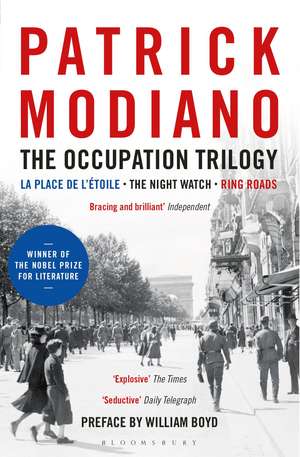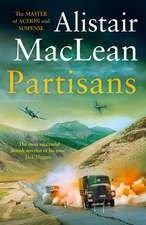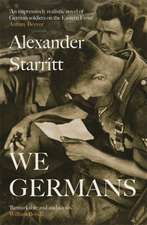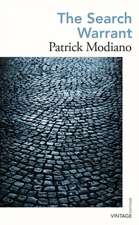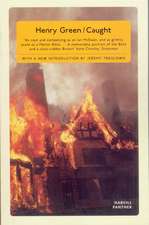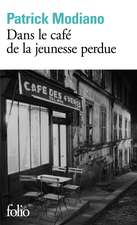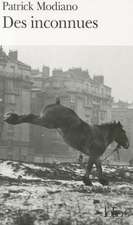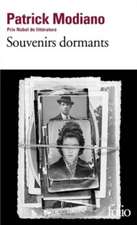The Occupation Trilogy: La Place de l'Étoile – The Night Watch – Ring Roads
Autor Patrick Modianoen Limba Engleză Paperback – 17 mai 2017
Preț: 79.82 lei
Preț vechi: 106.56 lei
-25% Nou
Puncte Express: 120
Preț estimativ în valută:
15.28€ • 15.89$ • 12.80£
15.28€ • 15.89$ • 12.80£
Carte disponibilă
Livrare economică 20 februarie-06 martie
Livrare express 06-12 februarie pentru 46.94 lei
Preluare comenzi: 021 569.72.76
Specificații
ISBN-13: 9781408867884
ISBN-10: 1408867885
Pagini: 352
Dimensiuni: 129 x 198 x 28 mm
Greutate: 0.25 kg
Editura: Bloomsbury Publishing
Colecția Bloomsbury Paperbacks
Locul publicării:London, United Kingdom
ISBN-10: 1408867885
Pagini: 352
Dimensiuni: 129 x 198 x 28 mm
Greutate: 0.25 kg
Editura: Bloomsbury Publishing
Colecția Bloomsbury Paperbacks
Locul publicării:London, United Kingdom
Caracteristici
Modiano's first three novels together make a trilogy of the dark and morally ambiguous period of the German Occupation of Paris
Notă biografică
Patrick Modiano was born in Paris in 1945 in the immediate aftermath of World War Two and the Nazi occupation of France, a dark period which continues to haunt him. After passing his baccalauréat, he left full-time education and dedicated himself to writing, encouraged by the French writer Raymond Queneau. From his very first book to his most recent, Modiano has pursued a quest for identity and some form of reconciliation with the past. His books have been published in forty languages and among the many prizes they have won are the Grand Prix du Roman de l'Académie française (1972), the Prix Goncourt (1978) and the Austrian State Prize for European Literature (2012). In 2014 he was awarded the Nobel Prize for Literature. Frank Wynne is the prize-winning translator of Michel Houellebecq, Frédéric Beigbeder and Boualem Sansal.
Recenzii
A swirling cacophony of characters in the tense, nervily hysterical world of the shady near-criminal types who stayed behind in Paris after the Nazis arrived . Powerfully Pinteresque, as characters bristle with menace and barely-contained violence
Like a cartoon strip in prose, caricatural and explosive . A disturbing evocation of the terror and treachery of the Occupation, and a mordant reminder of the tense relationship between Jewishness and Frenchness
Self-consciously outrageous ... Conventions and pieties are torn to pieces in a manner befitting a book published in Paris in 1968 . The more Modiano you read, the more seductive his work becomes ... Hypnotic and compulsive
Brisk, smart, witty, elliptical ... Recalls the directors of the New Wave - Godard, Truffaut, Louis Malle - as much as the opaque narrators of the nouveau roman . Frank Wynne captures this scattergun savagery with formidable bite . Bracing and brilliant ... Deepens the twilit mood of 1940s film noir or mid-period Graham Greene with an immersive intensity
A Marcel Proust of our time
Modiano is a pure original
Modiano is the poet of the Occupation and a spokesman for the disappeared, and I am thrilled that the Swedish Academy has recognised him
Europe's home-grown divisions haunt the edgy, atmospheric Parisian fictions of 2014 Nobel laureate Patrick Modiano: sample the three early novels of The Occupation Trilogy
Usually when we think of French novels or films about Vichy France we think of the heroism of the Resistance. Modiano has a much darker subject: the grey zone of French collaboration. He is drawn to the murky worlds of gangsters, informers, collaborators and black marketeers . This is Modiano's world as it was in the time of his father in wartime Paris . La Place de l'Étoile is very unusual for Modiano. It's a shocking, almost hysterical rant by a French, Jewish anti-Semite, Raphael Schlemilovitch. It is nasty, brutish and short. It's a very knowing, literary work with references to French writers, Jewish and anti-Semitic alike, from Proust and Sartre to the notorious Jew-hater Brasillach . Schlemilovitch constantly changes his identity. Few of Modiano's characters are sympathetic but Schlemilovitch is easily the least likeable . The Night Watch marks Modiano's breakthrough . The real change is in style. The narrative moves between a hazy, imprecise world where things are 'blurred' and 'fogged' to a precise world where everything is described in minute detail. Above all, there is a sense of mystery . By the end of Ring Roads, Modiano had found his voice and was on his way to becoming one of France's most fascinating contemporary writers
Like a cartoon strip in prose, caricatural and explosive . A disturbing evocation of the terror and treachery of the Occupation, and a mordant reminder of the tense relationship between Jewishness and Frenchness
Self-consciously outrageous ... Conventions and pieties are torn to pieces in a manner befitting a book published in Paris in 1968 . The more Modiano you read, the more seductive his work becomes ... Hypnotic and compulsive
Brisk, smart, witty, elliptical ... Recalls the directors of the New Wave - Godard, Truffaut, Louis Malle - as much as the opaque narrators of the nouveau roman . Frank Wynne captures this scattergun savagery with formidable bite . Bracing and brilliant ... Deepens the twilit mood of 1940s film noir or mid-period Graham Greene with an immersive intensity
A Marcel Proust of our time
Modiano is a pure original
Modiano is the poet of the Occupation and a spokesman for the disappeared, and I am thrilled that the Swedish Academy has recognised him
Europe's home-grown divisions haunt the edgy, atmospheric Parisian fictions of 2014 Nobel laureate Patrick Modiano: sample the three early novels of The Occupation Trilogy
Usually when we think of French novels or films about Vichy France we think of the heroism of the Resistance. Modiano has a much darker subject: the grey zone of French collaboration. He is drawn to the murky worlds of gangsters, informers, collaborators and black marketeers . This is Modiano's world as it was in the time of his father in wartime Paris . La Place de l'Étoile is very unusual for Modiano. It's a shocking, almost hysterical rant by a French, Jewish anti-Semite, Raphael Schlemilovitch. It is nasty, brutish and short. It's a very knowing, literary work with references to French writers, Jewish and anti-Semitic alike, from Proust and Sartre to the notorious Jew-hater Brasillach . Schlemilovitch constantly changes his identity. Few of Modiano's characters are sympathetic but Schlemilovitch is easily the least likeable . The Night Watch marks Modiano's breakthrough . The real change is in style. The narrative moves between a hazy, imprecise world where things are 'blurred' and 'fogged' to a precise world where everything is described in minute detail. Above all, there is a sense of mystery . By the end of Ring Roads, Modiano had found his voice and was on his way to becoming one of France's most fascinating contemporary writers
